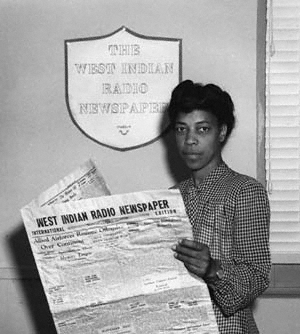Una Marson: Writer, Broadcaster and Campaigner for Equal Rights
Una Marson was a poet, playwright, campaigner and broadcaster. Born in Jamaica in 1905, she first visited Britain in 1932 and spent much of the 1930s and 1940s in Britain. On her first visit to Britain she worked with the League of Coloured Peoples, which had been founded in 1931 by Harold Moody, an organisation which campaigned for racial equality and for educational and employment opportunities.
In 1935, Marson represented Jamaica at the International Alliance of Women for Suffrage and Equal Citizenship Conference (IAWSEC) in Istanbul, Turkey. She was the first Black woman to attend this conference, which had been founded in 1904 by American and European women. Marson discussed, among other things, the brutality of lynching in America. However, a number of western delegates, in response, tried to explain away the provocations because of attacks on white women. Middle Eastern women rose in protest and solidarity with Marson but there were tense racial divisions within the global suffrage movement as Marson’s engagement with the IAWSEC showed.
In 1941, Marson started work as a Programme Assistant with the BBC Empire Service. She was the first Black women to be employed by the BBC and became the BBC’s first Black female producer. She worked on a programme called ‘Calling the West Indies’ and later established her own poetry stand ‘Caribbean Voices’, which featured Caribbean authors like George Lamming, Sam Selvon and Edward Kamau Braithwaite. Caribbean Voices featured over 200 Caribbean authors and ran from 1945 to 1946.
Marson was an important figure for the Caribbean community in Britain, but more broadly an important campaigner for racial equality and women’s rights around the world.

